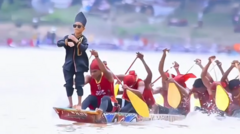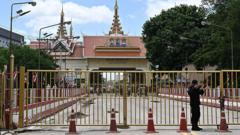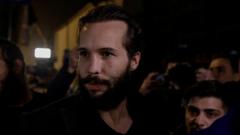#### The June re-run of Romania's presidential elections is mired in controversy after TikTok influencers are accused of collaborating in a campaign that purportedly bolstered the candidacy of Calin Georgescu, who is now banned from participating.
### Romanian Election Scandal Linked to TikTok Influencers

### Romanian Election Scandal Linked to TikTok Influencers
#### Social media manipulation allegations arise as Romania heads for new elections, following controversy and detainment of far-right candidate.
As Romanians prepare to head to the polls anew, the political landscape is overshadowed by the scandal of alleged social media manipulation. The tumult began with the annulled presidential election last December, marked by widespread protests triggered by claims of foreign interference, especially from Russia, and dubious online influence campaigns. Far-right candidate Calin Georgescu’s surprising lead in the initial vote has now raised serious questions about integrity in the electoral process.
After the accusations against Georgescu led to his disqualification and detention for allegedly attempting to destabilize Romania's constitutional governance, George Simion of the far-right AUR party has emerged as the frontrunner ahead of the re-run this weekend. Crin Antonescu from the National Liberal Party and independent candidate Nicușor Dan trail in the polls.
Central to this escalating conflict are allegations that TikTok influencers played a pivotal role in artificially inflating Georgescu's popularity on social media. Reports indicate his rapid rise—from a candidate polling at a meager 3-5% to nearly 23% within just weeks of aggressive TikTok campaigns. The Expert Forum think tank suggests that this surge was a result of orchestrated online tactics rather than genuine grassroots support.
Authorities assert that the TikTok platform was manipulated in multiple ways: through paid influencers promoting Georgescu indirectly, bot accounts amplifying comments in his favor, and a so-called "King of TikTok" who allegedly funded these efforts. Government sources have aligned these tactics with similar measures observed in Russian electoral meddling tactics seen in Ukraine.
While declassified intelligence reports underscore the alleged Russian influence in Romanian politics through various cyber means, many citizens express frustration over the lack of concrete evidence tying Russia to the election scandal.
The influencers involved in the campaigns, who were tapped via a marketing firm called FameUp, maintain that they were unaware of specific candidates behind the promotional content. For example, famous TikToker Cristina from Iasi emphasized that her posts aimed to stimulate voter turnout, not support any candidate directly, a sentiment echoed by others who received significant engagement noted as suspiciously favorable towards Georgescu.
Content creators who associated with Georgescu's campaign saw their videos flooded with pro-Georgescu comments soon after posting, igniting queries regarding the authenticity of these engagements. TikTok has claimed to block millions of fake interactions during this tumultuous election period, striving to mitigate manipulation on the platform.
The chaos escalated when it was revealed that the "stability and integrity" campaign, advantageous to the National Liberal Party, operated undercover to support Georgescu. In a shocking twist, the influencer known mainly as the "King of TikTok," Bogdan Peschir, was arrested for allegedly bribing influencers to endorse specific candidates.
As investigations unfold at both the European Commission and Romania's highest courts, the evidence and clarity surrounding the election cancellation remain elusive. Public sentiment continues to run high against allegations of external influence, leaving many wondering about the true extent and impact of the ongoing inquiries. Investigative journalist Razvan Lutac warns that piecing together the full picture may require a lengthy period, with citizens distraught over the uncertain fate of their democracy.




















